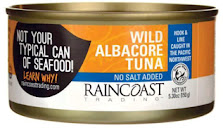Finding that the USPTO failed to give sufficient probative weight to a consent and coexistence agreement between the applicant and the cited registrant, the Board reversed a Section 2(d) refusal of the mark RAINCOAST DIP for "snack food dips" [DIP disclaimed], finding confusion unlikely with the registered mark RAINCOAST TRADING for seafood products [TRADING disclaimed]. The Board observed that the DuPont decision and its progeny have guided it to "consistently show great deference to consent agreements that detail the arrangements to be undertaken to avoid confusion." In re Dare Foods Inc., 2022 USPQ2d 291 (TTAB 2022) [precedential] (Opinion by Judge Peter W. Cataldo).
Based on website evidence, the Board found that the involved goods are related because "it is not uncommon for snack food dips as well as seafood and seafood snacks to emanate from the same source" under the same mark. This same evidence showed that the involved goods are offered in common channels of trade to overlapping customers. And the Board found the marks to be more similar than dissimilar in appearance, sound, and "particularly connotation and commercial impression."
Turning to the 10th DuPont factor, which concerns the market interface between applicant and registrant, the Board reviewed a 2013 agreement between the parties' predecessors [a copy of which is appended to the opinion]. In weighing the value of a consent agreement, the Board's assessment includes the following:
- Whether the consent shows an agreement between both parties;
- Whether the agreement includes a clear indication that the goods or services travel in separate trade channels;
- Whether the parties agree to restrict their fields of use;
- Whether the parties will make efforts to prevent confusion, and cooperate and take steps to avoid any confusion that may arise in the future; and
- Whether the marks have been used for a period of time without evidence of actual confusion.
In DuPont, the "seminal case on consent agreements, the CCPA cautioned that while 'a naked consent may carry little weight,' 'substantial' weight should be accorded to 'more detailed agreements.'" The details are what "lend substance and probative value to a consent agreement." The CCPA further observed:
[W]hen those most familiar with use in the marketplace and most interested in precluding confusion enter agreements designed to avoid it, the scales of evidence are clearly tilted. It is at least difficult to maintain a subjective view that confusion will occur when those directly concerned say it won't. A mere assumption that confusion is likely will rarely prevail against uncontroverted evidence from those on the firing line that it is not.
Here, the the parties entered into a detailed coexistence agreement to use and register. The basis for the agreement as to lack of confusion was (not surprisingly) the differences between the marks and the goods. The parties stated that they were unaware of any incidents of actual confusion, and they agreed to cooperate in steps to avoid confusion. Moreover, the same consent agreement was found persuasive by the USPTO in several of applicant's prior applications for RAINCOAST-formative marks.
The consent agreement in this appeal constitutes more than a mere naked consent and, therefore, plays a more dominant role in the likelihood of confusion analysis. Four Seasons Hotels, 26 USPQ2d at 1073; DuPont, 177 USPQ at 568. The Agreement does not discuss all of the factors relevant to consent agreements discussed in Four Seasons Hotels and other decisions. However, we are aware of no authority requiring a consent agreement to discuss all of these factors in order to be probative.
And so, the Board reversed the refusal to register.
Read comments and post your comment here.
TTABlogger comment: It is said that naked consents are probative only in nudist colonies.
The content of this article is intended to provide a general guide to the subject matter. Specialist advice should be sought about your specific circumstances.

